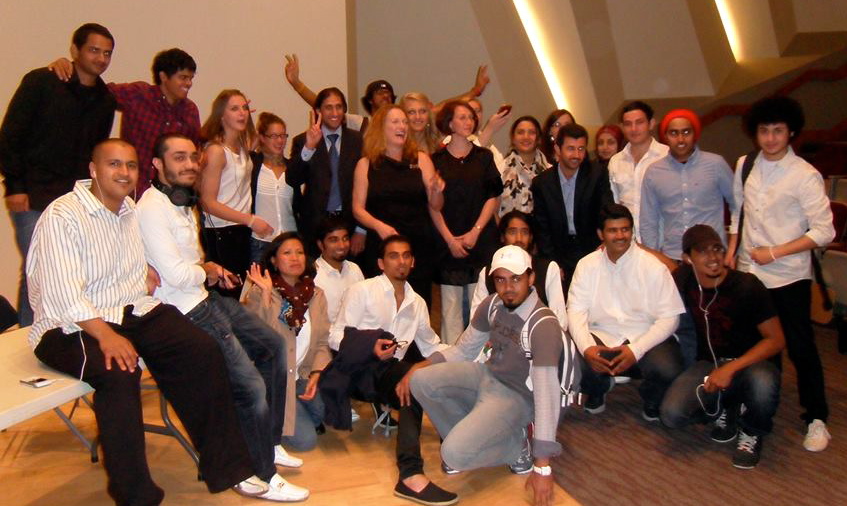Surveillance, Facebook topics of student debates, Nov. 21
The surveillance network of the National Security Agency is capable of observing 75 percent of all U.S. Internet traffic, according to a story published in The Wall Street Journal last August. In an era of encroaching privacy and security concerns, many are asking whether this extensive surveillance is doing more harm than good. Top-level students of the Intensive English Language Program (IELP) at the University of Arkansas at Little Rock are jumping into this heated discussion in a formal debate set for 8:30 a.m. Thursday, Nov. 21, in the Engineering and Information Technology Building auditorium.
The debate on surveillance will be followed by a 9:30 a.m. debate on whether the social media platform Facebook does more harm than good.
Five judges from around the community – which includes for the first time an alumnus of a previous debate team Abdul Al Khaldi – will assess the students’ performances.
The team of judges, which also includes Eric Harrison, Diane Lyons, Charles Wilson, and George Wittenberg, will grade on a rubric of performance expectations, such as how well the team uses a “hook” and handles cross-examination, as well as assessing the quality of team research.
The debate team students are enrolled in the IELP program, which has been helping non-native English speakers improve their skills in English as a second language for more than 20 years.
The students represent a range of native countries, from Sweden to South Korea, Saudi Arabia to Spain, according to instructor Pam Henline.
The debates started in 2010 as a way for Henline to enliven class discussion and enhance the language skills of her students. A political junkie, Henline, in cooperation with instructor Maria Foshee, decided her students would be best served by tackling a course in proper debate.
“Good debaters use all four language-acquisition skills – reading,writing, listening and speaking – plus they have to learn to do an almost-perfect group PowerPoint,” Henline explained.
Once the first competition was announced in 2010, Henline said the students competed strongly to be the best speaker, cite outstanding sources, and win.
“I’ve never seen so much language learned so fast in my life,” Henline said.
There are usually two to three debate teams composed of five speakers each, with non-speaking team members providing support through research and PowerPoint preparation.
Everyone enrolled in the course poses possible debate topics and votes on all their options.
“Then, we winnow it down to the most interesting, most current topics that lend themselves to ‘platinum’ level sources that can be cited,” said Henline.
She said this semester’s students have strong English-speaking skills, and most are earning master’s and doctoral degrees at UALR. Former Federal Attorney Paul Bowen voluntarily taught a class on speaking and cross-examination to help them advance their debate skills.
“Most importantly, these students have worked so hard,” said Henline. “We think the public will not only enjoy a lively discussion on hot topics but should also be extremely proud of these students’ efforts.”
For more information about the debates or the IELP program at UALR, contact Henline at 501.569.3468 or email her at [email protected].
Top-level students of the Intensive English Language Program (IELP) at the University of Arkansas at Little Rock are jumping into this heated discussion in a formal debate set for 8:30 a.m. Thursday, Nov. 21, in the Engineering and Information Technology Building auditorium.
The debate on surveillance will be followed by a 9:30 a.m. debate on whether the social media platform Facebook does more harm than good.
Five judges from around the community – which includes for the first time an alumnus of a previous debate team Abdul Al Khaldi – will assess the students’ performances.
The team of judges, which also includes Eric Harrison, Diane Lyons, Charles Wilson, and George Wittenberg, will grade on a rubric of performance expectations, such as how well the team uses a “hook” and handles cross-examination, as well as assessing the quality of team research.
The debate team students are enrolled in the IELP program, which has been helping non-native English speakers improve their skills in English as a second language for more than 20 years.
The students represent a range of native countries, from Sweden to South Korea, Saudi Arabia to Spain, according to instructor Pam Henline.
The debates started in 2010 as a way for Henline to enliven class discussion and enhance the language skills of her students. A political junkie, Henline, in cooperation with instructor Maria Foshee, decided her students would be best served by tackling a course in proper debate.
“Good debaters use all four language-acquisition skills – reading,writing, listening and speaking – plus they have to learn to do an almost-perfect group PowerPoint,” Henline explained.
Once the first competition was announced in 2010, Henline said the students competed strongly to be the best speaker, cite outstanding sources, and win.
“I’ve never seen so much language learned so fast in my life,” Henline said.
There are usually two to three debate teams composed of five speakers each, with non-speaking team members providing support through research and PowerPoint preparation.
Everyone enrolled in the course poses possible debate topics and votes on all their options.
“Then, we winnow it down to the most interesting, most current topics that lend themselves to ‘platinum’ level sources that can be cited,” said Henline.
She said this semester’s students have strong English-speaking skills, and most are earning master’s and doctoral degrees at UALR. Former Federal Attorney Paul Bowen voluntarily taught a class on speaking and cross-examination to help them advance their debate skills.
“Most importantly, these students have worked so hard,” said Henline. “We think the public will not only enjoy a lively discussion on hot topics but should also be extremely proud of these students’ efforts.”
For more information about the debates or the IELP program at UALR, contact Henline at 501.569.3468 or email her at [email protected]. View more stories in News
